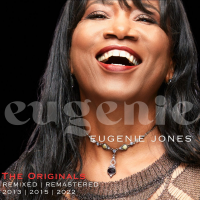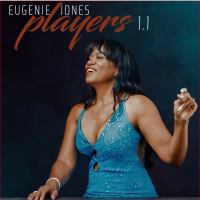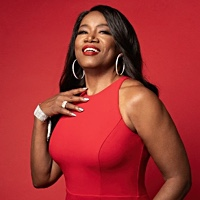Home » Jazz Musicians » Eugenie Jones
Eugenie Jones
Since she burst on the jazz scene in 2013, the award-winning, Seattle-based vocalist, composer, producer, and legacy activist Eugenie Jones has been one of our time's most evocative and evolving artists. NEA Jazz Master and bassist Reggie Workman described Jones as "an extraordinary singer, songwriter, and a source of light we're fortunate to experience." Thomas Staudter of The Gazette/New York lauded Jones for her "tremendous talent, tireless energy, and buoyant spirit," and Mark Holston of Jazziz praised Jones for her "…keen sense of phrasing, [which] makes her extremely persuasive. Like a veteran horn soloist, she slides effortlessly from one octave to the next, always landing on the right, pitch-perfect note."
Jones displayed all those attributes on her first four releases:
**Black Lace, Blue Tears** (2013), **Come Out Swinging** (2015), **Players** (2022), the soulful jazz derivative **Players 1.1** (2023), and **The Originals** (2024). With the release of her new album, **EUGENIE** Jones extends and elaborates on her jazz-honed, vivid, and vivacious vocals. Jones' vocals, which have been praised by legendary bandleader Joe Chambers as "Excellent" and capable of encompassing multiple idioms, are a true testament to her musical prowess.
Unlike **Players** - a two-disc album recorded in Dallas, New York, Chicago, and Seattle with thirty-two world-class jazz musicians, including bassists Reggie Workman and Lonnie Plaxico; drummer Bernard "Pretty" Purdie; percussionist Bobby Sanabria; trumpeter Marquis Hill and legendary trombonist Julian Priester, EUGENIE is a single disc project. With 32 published songs to her credit, the release casts a focused spotlight on the depth and breadth of Jones' lyricism, her adaptive vocal style from sultry blues to hard-swinging classics, and her ability to create intensely passionate renderings of emotively gripping ballads.
"At this point in my life, my priorities and feelings have changed compared to when I recorded **Players** two years ago," Jones explains. "This project reflects that shift in mental focus, marking a shift in thinking and a progression of skills that gave me the confidence to tackle more complex and challenging compositions.
I didn't study music in school; I graduated with an MBA and initially worked in corporate marketing. It wasn't until later that I realized my natural musical abilities, which I believe I inherited from my mother. Even without a formal music education, I feel fortunate to create songs that resonate with listeners, entertain them, and uplift their spirits."
EUGENIE features 13 selections composed of - to riff on an old phrase - somethings old, somethings new, somethings borrowed, something blue; specifically, several selections featuring music associated with Nat Adderley, Oscar Brown, Jr., Nina Simone, Peggy Lee, Duke Ellington, and Carole King. In addition to her unique "Eugenie-izing" interpretation of classics, this release further exemplifies Jones' ability to show she is a composer that is an intelligent, thoughtful composer in the tradition of Abbey Lincoln, Nina Simone, and
Read moreTags
Eugenie Jones: Eugenie

by Richard J Salvucci
Eugenie Jones seems to be another one of those singers who did not start out as one but got there as soon as she could. Make no mistake, she ended up in the right profession, self-confessedly in the tradition of Nina Simone and Abbey Lincoln. Jones writes as well, and several of her own songs, “Starlight Starbright," “Hold Back the Night," “It's OK," “Nothing Better" and “Say What You Will" round out a recording of a selection of classics by ...
Continue ReadingTake Five with Eugenie Jones

by AAJ Staff
Meet Eugenie Jones Born and raised in Morgantown, West Virginia, Eugenie Jones's father, Eugene, was the director of the local Friendship Baptist Church Choir, and her mother was the choir's lead soprano. However, Jones possessed no latent desire to one day become a singer herself. She earned her MBA, married, and moved to Seattle, raising two sons. Her singing career began later in life, after her mother Tommie's death. Jones was inspired to start singing to carry ...
Continue ReadingEugenie Jones: Come Out Swingin'

by C. Michael Bailey
The last we heard from Seattle-based Renaissance woman Eugenie Jones was on her quite excellent debut recording Black Lace Blue Tears (Self Produced, 2013). On that recording Jones demonstrated great accomplishment as a vocalist, composer, and arranger. She was in the process of transitioning from a successful marketing career to a singer. That kind of change is not for the faint of heart. Jones returns with Come Out Swinging, a collection of tunes as different from those ...
Continue ReadingEugenie Jones: Black Lace Blue Tears

by C. Michael Bailey
Seattle-based vocalist/composer/arranger Eugenie Jones didn't start out as such. A business and marketing major in college, Jones graduated and went on to be a business owner, consultant and all-around marketing roustabout. But life is never so simple and after her mother's death, Jones decided that it was time to pursue music as a vocation. On her debut Black Lace Blue Tears Jones flexes all of her creative muscles assembling nine originals and interpreting two standards, all at a high level. ...
Continue ReadingEugenie Jones Kicks Off Women In Jazz Month National Tour

Source:
Olivia Long
On March 6th, award-winning jazz singer-songwriter Eugenie Jones is set to ignite her Women in Jazz Month Tour at Denver’s premier music venue, Dazzle Jazz Club, with the tour journey continuing to metro-Atlanta’s chic Velvet Note Jazz Club on March 14th, San Francisco’s stylish Mr. Tipple’s on March 20th, and Seattle’s genre-bending Royal Room on March 27th. This tour is a part of the global March celebration of Women in Jazz Month, shining a spotlight on the groundbreaking contributions of ...
read more
For Your Grammy Consideration: Players by Eugenie Jones (Best Jazz Vocal Album Category)

Source:
Bright Ideas
The four-years, four-cities, 32-musician-project, Players, by singer/songwriter Eugenie Jones is now available for your Grammy consideration. Listeners are invited to review this ten-original, five-jazz classic, two-disc project during round-one consideration. The Players NEW YORK: James Weidman, Julian Priester, Marquis Hill, Reggie Workman, Bernard Purdie, Bobby Sanabria, Asaf Even Zur, Stanley Banks, Jovan Johnson. SEATTLE: Bill Anschell, Julian Priester, Alex Dugdale, Jay Thomas, Clipper Anderson, Mark Ivester, D’Vonne Lewis, Jeff Busch, Velocity, Delvon Lamarr Organ Trio. DALLAS: Shaun Martin, Lynn Seaton, ...
read more
Vocalist-Songwriter Eugenie Jones Revels In Variety Both Musical And Geographical On 'Players,' Set For March 11 Release By Open Mic Records

Source:
Terri Hinte Publicity
“Wide-ranging” takes on a new meaning with the March 11 release of vocalist/composer/lyricist Eugenie Jones’s Players on her own Open Mic Records. Jones’s third album is the result of an odyssey that took her from her Pacific Northwest base (Seattle) to the Deep South (Dallas), the bustling East Coast (New York), the Midwestern Plains (Chicago), and back again, working in the process with a jaw-dropping spectrum of major jazz musicians that includes (among others) bassists Reggie Workman and Lonnie Plaxico, ...
read more
Seattle Jazz Singer Eugenie Jones To Release "Come Out Swingin'" May 12

Source:
Terri Hinte Publicity
Eugenie Jones’s widely praised 2013 debut, Black Lace Blue Tears, introduced a late-blooming but fiercely original jazz vocalist and songwriter to the jazz world. Among other honors, the disc was named Earshot Jazz’s Northwestern Recording of the Year. The Seattle-area singer’s response to her warm critical reception was to start writing again and prove that her success was no fluke. On her impressive follow-up, Come Out Swingin’, Jones displays the rhythmic authority, emotional insight, and melodic invention of an artist ...
read more
"Black Lace Blue Tears," Debut CD For Seattle-Area Jazz Singer Eugenie Jones, Due May 28

Source:
Terri Hinte Publicity
With the release of her debut album Black Lace Blue Tears, Seattle-based Eugenie Jones emerges as a rising jazz vocal star with a deep-rooted sense of where she’s headed as an artist. Jones’s repertoire is based primarily on her own striking originals, and she also had a hand in all of the arrangements. The disc is due from Jones’s Open Mic Records on May 28. Throughout Black Lace Blue Tears Jones receives first-rate support from three of Seattle’s most gifted ...
read more
"This album is a winner. Each track will get under your skin, make you want to get up and dance, feel empowered, or experience beauty in sadness: one thing it will not do is leave you indifferent." The New York City Jazz Record | Anna Steegmann
Photos
Music
Starlight Starbright
From: EugenieBy Eugenie Jones
Nothing Better
From: EugenieBy Eugenie Jones
Sittin at the Bar
From: PlayersBy Eugenie Jones
There Are Thorns
From: PlayersBy Eugenie Jones
Swing Me
From: Come Out Swingin'By Eugenie Jones
I Could Get Lost In Your Eyes
From: Come Out Swingin'By Eugenie Jones
Black Lace Blue Tears
From: Black Lace Blue TearsBy Eugenie Jones
A Good Day
From: Black Lace Blue TearsBy Eugenie Jones














